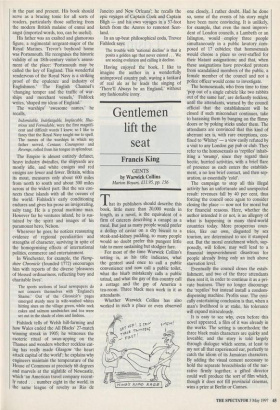Gentlemen lift the seat
Francis King
GENTS by Warwick Collins Marion Boyars, f11.95, pp. 156 That its publishers should describe this book, little more than 20,000 words in length, as a novel, is the equivalent of a firm of caterers describing a canapé as a meal. But just as many people would prefer a dollop of caviar on a dry biscuit to a steak-and-kidney pudding, so many people would no doubt prefer this pungent little tale to more sustaining but stodgier fare.
For most of the time Warwick Collins's setting is, as his title indicates, what the genteel used once to call a public convenience and now call a public toilet, what the blurb mistakenly calls a public urinal, and what the gay of this country call a cottage and the gay of America a tea-room. Three black men work in it as attendants.
Whether Warwick Collins has also worked in such a place or even observed one closely, I rather doubt. Had he done so, some of the events of his story might have been more convincing. It is unlikely, for example, that even the most improvi- dent of London councils, a Lambeth or an Islington, would employ three people simultaneously in a public lavatory com- posed of 17 cubicles; that homosexuals would choose a place so over-staffed for their blatant assignations; and that, when these assignations have provoked protests from scandalised members of the public, a female member of the council and not a police officer would come to investigate.
The homosexuals, who from time to time `pop out of a single cubicle like two rabbits out of the same hat', are defiantly reckless, until the attendants, warned by the council official that the establishment will be closed if such misconduct continues, take to harassing them by banging on the flimsy doors or by poking sticks under them. The attendants are convinced that this kind of aberrant sex is, with rare exceptions, con- fined to 'Whitey' — a view easily refuted by a visit to any London gay pub or club. They refer to the homosexuals as `reptiles' inhab- iting a 'swamp', since they regard their hectic, hurried activities, with a brief flare of presence as each enters the establish- ment, a no less brief contact, and then sep- aration, as essentially 'cold'.
The campaign to stop all this illegal activity has an unfortunate and unexpected result: revenues fall by 40 per cent, thus forcing the council once again to consider closing the place — now not for moral but for financial reasons. Here, whether the author intended it or not, is an allegory of what is happening in many third-world countries today. More prosperous coun- tries, like our own, disgusted by sex tourism, are determined to see it stamped out. But the moral enrichment which, sup- posedly, will follow, may well lead to a financial impoverishment disastrous for people already living only an inch above starvation level.
Eventually the council closes the estab- lishment, and two of the three attendants then rent it, in order to continue it as a pri- vate business. They no longer discourage the 'reptiles' but instead install a condom- dispensing machine. Profits soar. The cyni- cally entertaining conclusion is that, when a man's livelihood is at stake, his tolerance will expand miraculously.
It is easy to see why, even before this novel appeared, a film of it was already in the works. The setting is unorthodox; the three black main characters are quirky and loveable; and the story is told largely through dialogue which seems, at least to my not all that experienced ear, perfectly to catch the idiom of its Jamaican characters. By adding the visual cement necessary to hold the separate breezeblocks of the nar- rative firmly together, a gifted director could well produce the sort of film which, though it does not fill provincial cinemas, wins a prize at Berlin or Cannes.


































































 Previous page
Previous page